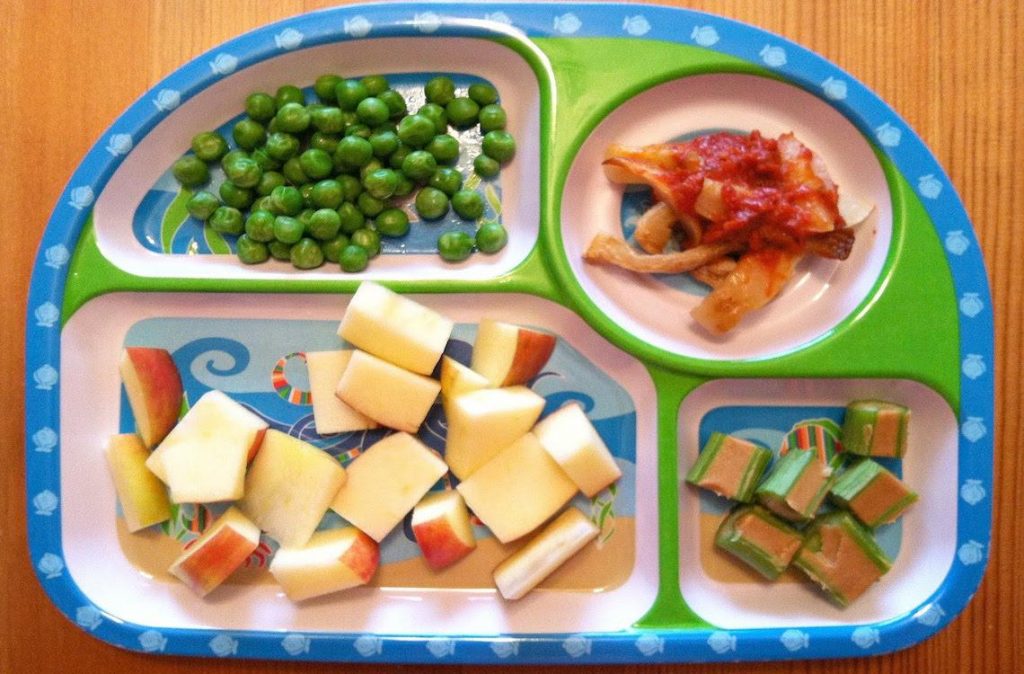A varied, balanced diet of healthy food is key to helping your toddler thrive. By age two, your child should be eating three small meals a day, plus one or two snacks throughout the day. As your toddler is growing at an incredible rate, it is important that he receives the right combination of calories and nutrients to keep him going.
How to encourage healthy eating habits?
Many toddlers go through phases of fussy eating as they grow up, but don’t despair, as there is plenty you can do to encourage healthier eating habits and ensure your little one is getting what he or she needs.
When feeding toddlers, do not be too fixated about the amount left on the plate. Let your toddler eat the same foods as the rest of the family, and get the whole family to eat together at the table. It can also be easier to prepare food that can be eaten as finger food as compared to needing a fork and spoon. Offering a variety of sweet and savoury foods will also help make eating more exciting for him!
Remember to respect your toddler’s tastes to a reasonable extent, as it will make life much easier for both of you. Lastly, remember to reward your toddler with words of praise when he or she eats well, but avoid using food as a reward or comfort as this can lead to unhealthy eating habits.
What kind of food can I feed my toddler?
Remember that you don’t have to stick to a certain kind of food that your toddler doesn’t like to provide him with a nutrient. For example, if he dislikes meat, he can also obtain protein from peas and beans.
To help your child eat well, feed him from one of the following food groups every day:
1. Carbohydrates
Make sure you offer carbohydrates to your child with every meal. This can include:
-
Cereals
-
Rice
-
Porridge
-
Potatoes
-
Yams
-
Bread
-
Crackers
You can offer your little one a combination of both white and wholegrain foods. However, try not to only offer him only wholegrain foods. Wholegrain foods can be more filling which can cause him to stop eating before he has had enough nutrients and calories.
2. Fruits and vegetables
Highlighted
Fruits and vegetables are a very important food group as they contain essential vitamins and nutrients to help your child’s growth and development. Your toddler may prefer fruits to vegetables because of their sweeter taste, but vegetables should always be offered so your little one learns that they’re a normal component of every meal.
Try choosing fruits and vegetables of unusual colours or shapes, or be creative and arrange them into the shape of a face on the plate. Multi-coloured fruit platters of strawberries, banana and berries can work well to spark interest in your toddler, and is healthy to boot!
Try to offer fruit as a dessert to your child, so he learns that dessert doesn’t always have to mean biscuits or sweets.
3. High-iron and high-protein foods
Your toddler will need these foods at least twice a day. Some common sources are:
-
Meat
-
Fish
-
Eggs
-
Chopped nuts
-
Lentils and chickpeas
These foods are important for your child’s growth and to avoid any iron-deficiency. Ensure that the meat products used are of good quality, and are lean with minimal salt added. Try to experiment with different flavours of the marinade to keep your little one interested and curious!
4. Dairy products
Dairy products are a source of calcium, which is important for strong bones and teeth. Ideally, your toddler should have 3 portions a day. Dairy foods include:
-
Milk
-
Yoghurt
-
Cheese
Milk is a good source of calcium, and cow’s milk or breastmilk is fine for your toddler. Always choose full-fat milk as it contains more vitamin A and more calories for your little toddler. If yoghurt is given, try to choose one which doesn’t have a lot of sugar.
What kind of foods should I avoid?
1. Fatty and sugary foods such as cakes and ice cream
These foods have little nutritional benefit and may cause your toddler to become overweight. Try to limit these foods and opt for healthier alternatives.
2. Sweets and chocolate
These are fine for an occasional treat, but should not be given every day as it can ruin your child’s appetite and also cause teeth damage.
3. Salty foods
Young children from ages 1-3 should not have more than 2 g of salt a day. Hence, try to offer salty snacks no more than once or twice a week. Also, try to avoid salt in your child’s meal.
DoctorOnCall is Malaysia’s first Online Clinic that allows chat, phone, and video calls directly with a registered Malaysian doctor at www.DoctorOnCall.com.my DoctorOnCall also provides affordable medication delivery to your doorstep.
Facebook: https://www.facebook.com/doctoroncallMY
Instagram: https://www.instagram.com/doctoroncallmy
